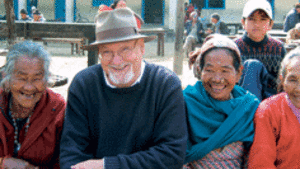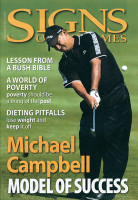I too am a beggar! Where I live, begging is a way of life, a means of subsistence—even a livelihood. Poverty and riches, wealth and degradation co-exist in an amalgam we call society. At first I found it difficult to confront such widespread poverty.
Several years ago, while stationed in the Philippines, I was out early walking around Intramuros, the ancient walled city of the Spanish in Manila. It's a magnificent though neglected heritage. It has stood for 400 years as a symbol of colonial power, church and empire. Its ramparts carried the cannons as protection for the marauders who might come from near or far, to plunder the wealth and women.
As I traipsed along, a man with few means, living on the footpath, came up to me and said, “Give me some money.”
I rarely carry anything more than a few coins or small notes and on this occasion I had none of the pesos for which he was begging. I indicated, “I don't have any money.”
He turned to me again and said, “You don't love me.” I thought quickly, stopped uncharacteristically in my track, and turned to speak with him. I looked him directly in the eye as I spoke, and said, “Love is not something you buy. Love is deeper. It's in the heart.” I had no knowledge of how he would respond, but I felt I saw the thought penetrating the man's heart. A glimmer of acknowledgment spread across his face, he smiled, and we headed in different directions. It was a most powerful meeting of minds.
Just yesterday, I stopped to drop some coins into the hands of an ageing woman on the footpath. Her few rags were dragged closely around her legs. The headscarf, more like a bonnet, was pulled tightly around her face, with only the bottom portion visible. The skin was hardened to the elements of the weather. And there was no eye contact, just the outstretched hand for the pesos that provide food. I wondered just what her greatest need was, and if ever it could be supplied, for often it is not the physical needs for which people hunger most but the deeper food for the soul.
As I've walked these parts, people call me “Joe,” giving me an American citizenship before they know where I'm from. The moment people look at me they think I'm an American, an attribution that has both positive and negative consequences in many countries of the world. Nor would they understand if I said, “No, I'm Ozzie.” (Well, Aussie, if you prefer.) On another day, again walking the walls of the Intramuros, I had a boy look up into my face and say, “Hi, man!” He made me feel truly human, yet he probably wasn't even aware of it. He did not label me with nationality. He did not detract from my personhood. He acknowledged the uniqueness that God created in me. He will never know how meaningful that was.
The theologian and practical philosopher Henri Nouwen wrote: “Why is it that we keep that great gift of care so deeply hidden? Why is it that we keep giving dimes without daring to look into the face of the beggar? Why is it that we do not join the lonely eater in the dining hall but look for those we know so well? Why is it that we seldom knock on a door or grab a phone, just to say hello, just to show that we have been thinking about each other? Why are smiles still hard to get and words of comfort so difficult to come by? Why is it so hard to express thanks to a teacher, admiration to a student, and appreciation to the men and women who cook, clean, and garden? Why do we keep bypassing each other always on the way to something or someone more important?"
“Maybe simply because we ourselves are so concerned to be different from the others that we do not even allow ourselves to lay down our heavy armour and come together in a mutual vulnerability. Maybe we are so full of our own opinions, ideas and convictions that we have no space left to listen to the other and learn from him or her.”1
There is a wealth of poverty that the earthly rich can never know and a poverty of riches that the poor will never understand. In Jesus Christ for Today's World, Jurgen Moltmann points the way for restoration from the poverty that is so widespread. He says, “Proclaiming God's kingdom to the poor means giving back to them the divine dignity of which the violent have robbed them. Healing the sick means planting the seeds of life in this world of death. Cleansing the lepers means accepting the handicapped who are pushed out of our society. Casting out devils means shaking the idols set up in our national and social life, to which so many of the weak have been sacrificed. In other words, men and women who take Christ's road take up the struggle of life against death. And as a result they will get to feel the violence of the powerful, who spread death because they live at other people's cost."
“So following Christ means engaging in the struggle of life against death, and against the people who spread death. It means engaging in this struggle in our own place and our own time.”2
So when as disciples we follow the richness of Christ's poverty, we become the disciplined of the Lord, we experience the messianic act of restoration and fulfilment, whether we be the beggar by the roadside receiving, or the unstinting hand that is giving, the one who out of abundance is responding to the outstretched hand. Of course the locations and needs change, but we are always in the midst of poverty, be it our own or another's. It's no wonder Christ said, “In everything do to others as you would have them do to you; for this is the law and the prophets” (Matthew 7:12, NRSV).




